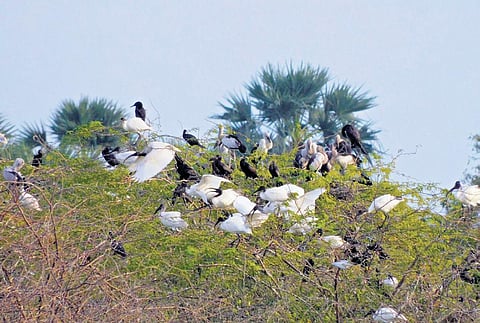

THOOTHUKUDI: Migratory and wetland birds visiting Thirupani Chettikulam village, which nest on seemai karuvelam trees on private patta lands on the banks of Chettikulam tank, are confronting a grave threat of the removal of thorny bushes by the landowners. Bird enthusiasts are seeking the intervention of the district-level biodiversity committee to protect the site, pointing out that it is the only bird breeding site left in Thoothukudi district.
The rainfed Chettikulam tank near Sawyerpuram extends south up to Valasaikaranvilai, and has stored water up to its full capacity now, thanks to the intense northeast monsoon, which has attracted a large number of birds. However, the birds have settled for nesting and roosting on the thorny bushes known as prosopis juliflora (seemai karuvelamaram) growing in several acres of private land adjacent to the tank.
According to birders, some of the native birds here are open bill stork, black-headed ibis, Indian darter, glossy ibis, cormorants, egrets and night herons. They breed here and move to other wetlands in peninsular India when the Chettikulam tank dries up. The black-winged stilts that breed on the ground are also found here. Migratory birds such as godwits, wood sandpiper, garganey ducks, northern shovellers, little stints and many others are also spotted here, they say.
Birder and Pearlcity Nature Trust secretary Thomas Mathibalan told TNIE the nesting area on private patta lands largely falls in the neighbouring Nattathi village panchayat. “The birds dwell on the seemai karuvelam bushes, only because the native thorny trees that usually spread inside the tank bed were cut down for firewood. I have seen pelicans, painted storks and other birds perching on the native thorny trees grown inside the tank since 1970. When all the native thorny trees were razed out, the birds moved to the adjoining patta land,” he added.
Activists and the villagers are also concerned about the safety of the birds, as the private patta landowners can any day cut down the karuvelamaram trees as they have good demand as firewood and in charcoal industries.
Senior Research Associate M Mathivanan of Ashoka Trust for Research in Ecology and the Environment (ATREE) noted the native thorny trees of vachellia nilotica, more commonly known as acacia nilotica, would be a better place for the seasonal birds to nest. “The densely growing seemai karuvelam trees are riskier, because the chicks and juveniles would get entangled in the thorns, and die hanging, as they cannot flap wings to come out. The Chettikulam tank is the only wetland breeding site in Thoothukudi district, going by the decade-long Thamirabarani waterbird count,” he said.
Mathibalan recalled that the bird breeding sites at Pettaikulam and Vellur tanks in the district were already lost as the bushes there were removed. "If native trees are planted on the tank bed, these birds would find a safe habitat and won’t nest on thorny trees on private lands. Apart from chalking out an action plan to protect the bird breeding site, the district-level biodiversity committee should also propose a bird sanctuary status for the Chettikulam tank,” he appealed. Thirupani Chettikulam panchayat president Suyambu told TNIE that he would take appropriate measures to protect the seasonal birds that visit the tank.
However, the villagers are apprehensive of the tank receiving a bird sanctuary status as then it would be under the control of the forest department. Researcher Mathivanan suggested that the biodiversity management committee of the village should record the flora, fauna and livestock in the people's biodiversity registry of the village, and propose the bird breeding site for the Biodiversity Heritage Site tag, which will maintain a status quo on the tank's ownership and won’t affect the farmers’ rights on the tank.